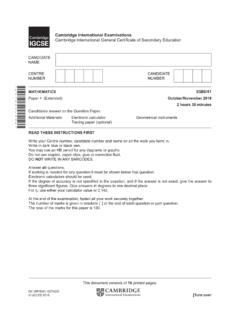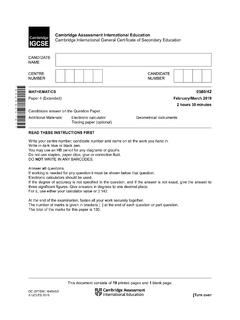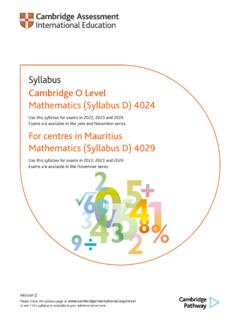Transcription of Cambridge Assessment International Education Cambridge …
1 Cambridge Assessment International Education Cambridge International General Certificate of Secondary Education ECONOMICS 0455/22. Paper 2 Structured Questions May/June 2019. 2 hours 15 minutes No Additional Materials are required. * 9 0 7 4 1 6 6 1 7 8 *. READ THESE INSTRUCTIONS FIRST. An Answer Booklet is provided inside this Question Paper. You should follow the instructions on the front cover of the Answer Booklet. If you need additional answer paper ask the invigilator for a Continuation Booklet. Section A. Answer Question 1. Section B. Answer any three questions. The number of marks is given in brackets [ ] at the end of each question or part question. This document consists of 5 printed pages, 3 blank pages and 1 Insert. DC (ST/CT) 164709/1. UCLES 2019 [Turn over 2. Section A. Answer this question. 1 Premium Friday At the start of February 2017, the Japanese government introduced its Premium Friday' scheme. This encourages employers to allow their workers to leave work at 15:00 on the last Friday of each month, without experiencing any reduction in their wages.]
2 The Japanese government wants to reduce the number of hours people work. One reason is to improve the health, and so possibly the productivity, of workers. Fig. shows the average number of hours worked and productivity (GDP per hour worked in US $) in six selected countries. 80. 70. 60. 50. 40. 30. 20. 10. 0. France Germany Japan Mexico Russia South Korea Average hours worked per week Productivity (GDP per hour worked (US $)). Fig. Average hours worked and productivity of selected countries in 2017. Nearly one quarter of Japanese workers work more than 50 hours a week and some work more than 25 hours overtime a week. The average Japanese worker only takes half of their paid holidays. Nearly 20 years of low economic growth and deflation have created a sense of job insecurity. Trade unions in Japan have been concentrating on trying to achieve shorter working hours. The government thinks that working fewer hours would give people more time to bring up a child and look after elderly relatives.
3 Japan's birth rate has fallen every year for the last 36 years, and at a faster rate than the fall in the death rate leading to a fall in the size of the population. The government hopes more leisure time will encourage an increase in consumer spending. Higher consumer spending would benefit Japanese firms and would reduce the chances of deflation returning. The initial response to Premium Friday was not promising. At the end of February 2017, only 4%. of Japanese workers left early. In the longer run, however, the scheme may be more successful. This is because unemployment in the country had fallen with only 2 million out of a labour force of 66 million being unemployed at the end of February 2017. Low unemployment increases job security and usually increases wages. In Japan's case, however, the higher demand for labour has been matched by a higher supply. Some of this higher supply has come from migrant workers, but a greater proportion has come from more Japanese people working past retirement age and more women working.
4 UCLES 2019 0455/22/M/J/19. 3. (a) Identify, using information from the extract, two factors that influence an individual's choice of occupation. [2]. (b) Explain, using information from the extract, an opportunity cost of working. [2]. (c) Calculate, using information from the extract, the number of Japanese workers who left work early on Premium Friday in February 2017. [2]. (d) Explain, using information from the extract, why the size of Japan's population has fallen in recent years. [4]. (e) Analyse, using Fig. , the relationship between the average hours worked and productivity. [5]. (f) Discuss whether or not a cut in income tax would stop deflation. [5]. (g) Explain, using information from the extract, why wage rises have been low in Japan. [4]. (h) Discuss whether or not Japan will benefit from employing more migrant workers. [6]. UCLES 2019 0455/22/M/J/19 [Turn over 4. Section B. Answer any three questions from this section. 2 The markets for cars and tyres are closely related.]
5 The five largest tyre firms used to make 66%. of all tyres. The entry of more than 250 Chinese firms has reduced the global market share of the largest five firms to less than 50%. This also changed the price elasticity of demand (PED). for individual firms' tyres. Some of these firms are state-owned enterprises and some are in the private sector. (a) Identify two types of business organisation that operate in the private sector. [2]. (b) Explain what effect more firms producing tyres would have on the PED of individual firms'. tyres. [4]. (c) Analyse, using a demand and supply diagram, the effect of an increase in demand for cars on the market for tyres. [6]. (d) Discuss whether a large firm will earn more profit per unit sold than a small firm. [8]. 3 There was a global surplus of steel in 2017. In mid-2017, the US government considered imposing tariffs on steel imports to protect its declining steel industry. Cheap imports from other countries were reducing employment in the US steel industry.
6 The pattern of US employment was also being affected by improvements in Education . (a) Identify two methods of trade protection other than tariffs. [2]. (b) Explain how market forces will eliminate a surplus and a shortage. [4]. (c) Analyse how improvements in Education can affect the pattern of employment. [6]. (d) Discuss whether or not the imposition of import tariffs by a country will reduce its unemployment. [8]. 4 In March 2017, Peru was hit by floods and the strongest winds in decades. Roads, bridges, houses and capital goods were destroyed. It is expected that the damage caused will affect Peru's Human Development Index (HDI) and economic growth rate. In 2016, Peru experienced a 4% economic growth rate which was higher than the growth rate of the USA. (a) Define a capital good. [2]. (b) Explain two causes of an increase in a country's HDI. [4]. (c) Analyse, using a production possibility curve (PPC) diagram, the effect of damaging weather on an economy.
7 [6]. (d) Discuss whether countries with a high Gross Domestic Product (GDP) per head will have a faster rate of economic growth than countries with a low GDP per head. [8]. UCLES 2019 0455/22/M/J/19. 5. 5 Moldova is Europe's poorest economy with many of its people living in poverty. It is mainly an agricultural economy with many small farms. Its shops are also small. The government has used a range of policies, including supply-side policy, to improve the economy's performance. It has mostly been successful. For instance, unemployment has fallen. (a) Identify two supply-side policy measures. [2]. (b) Explain two ways a government could reduce relative poverty. [4]. (c) Analyse the reasons why small shops may be easy to set up. [6]. (d) Discuss whether or not firms will benefit from a fall in unemployment. [8]. 6 In a mixed economic system, such as Portugal's, the government intervenes in the economy. Reasons for government intervention include to correct market failure and to achieve its aims for the economy, such as control of inflation.
8 In 2017, one-fifth of Portugal's population was living in poverty and the government increased its spending. (a) Identify two reasons why market failure may occur. [2]. (b) Explain how resources are allocated in a mixed economic system. [4]. (c) Analyse how a high rate of inflation may harm the poor. [6]. (d) Discuss whether or not increasing government spending will enable a government to achieve its aims for the economy. [8]. 7 The price elasticity of demand (PED) for sugar in most countries is less than 1. In 2017, the price of sugar fell. However, the price of specialised, higher quality sugar grown in countries such as Mauritius fell by less than the average global price. Efficient producers, such as some farmers in Brazil that have a low fixed cost of production, were also less affected by the fall in price. (a) State the formula used to calculate PED. [2]. (b) Explain two reasons why the price of sugar may fall. [4]. (c) Analyse the possible reasons why a producer's fixed cost may increase.
9 [6]. (d) Discuss whether or not a country will benefit from specialising in an agricultural product such as sugar. [8]. UCLES 2019 0455/22/M/J/19. 6. BLANK PAGE. UCLES 2019 0455/22/M/J/19. 7. BLANK PAGE. UCLES 2019 0455/22/M/J/19. 8. BLANK PAGE. Permission to reproduce items where third-party owned material protected by copyright is included has been sought and cleared where possible. Every reasonable effort has been made by the publisher (UCLES) to trace copyright holders, but if any items requiring clearance have unwittingly been included, the publisher will be pleased to make amends at the earliest possible opportunity. To avoid the issue of disclosure of answer-related information to candidates, all copyright acknowledgements are reproduced online in the Cambridge Assessment International Education Copyright Acknowledgements Booklet. This is produced for each series of examinations and is freely available to download at after the live examination series.
10 Cambridge Assessment International Education is part of the Cambridge Assessment Group. Cambridge Assessment is the brand name of the University of Cambridge Local Examinations syndicate (UCLES), which itself is a department of the University of Cambridge . UCLES 2019 0455/22/M/J/19.










